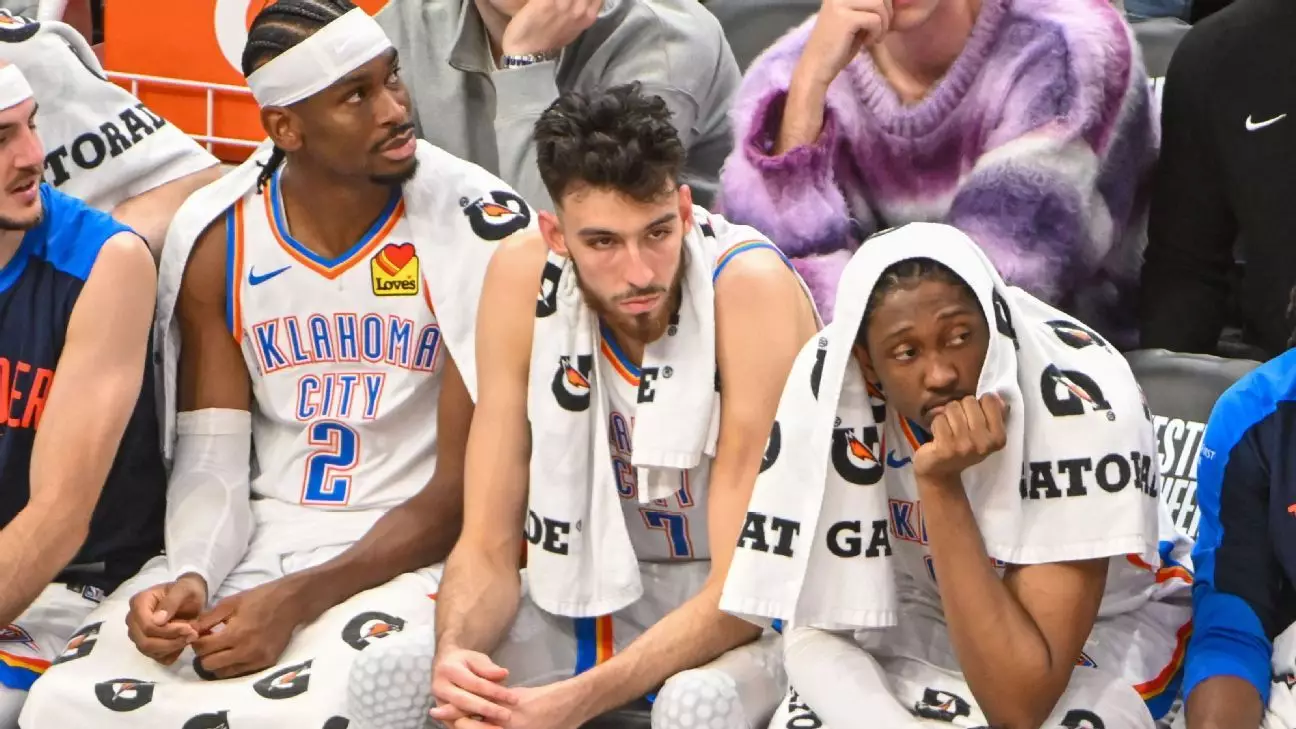The Oklahoma City Thunder faced an overwhelming defeat against the Minnesota Timberwolves in Game 3 of the Western Conference finals, suffering a staggering 143-101 loss. This was not just another game; it was a pivotal moment that exposed the vulnerabilities and weaknesses of a franchise accustomed to higher standards. The disappointment was palpable—not just because of the score, but due to the apparent discrepancies in effort, strategy, and execution. Thunder power forward Chet Holmgren voice this struggle succinctly, stating, “Wherever they wanted to go, they got there.” In essence, this game served as a stark reminder of the harsh realities of playoff basketball, revealing how quickly momentum can shift and how essential adaptability is in competitive sports.
A Tactical Breakdown: What Went Wrong?
From the opening tip-off, the Thunder appeared to be in disarray, unable to match the Timberwolves’ energy or physicality. It was almost as if the players stepped onto the court with different goals in mind. Oklahoma City’s defense, typically a point of pride for the team, saw an unprecedented lapse. Allowing a field goal percentage of over 57% was a defensive nightmare, compounded by their inability to force turnovers—only managing ten throughout the entire game. This lack of pressure not only gave Minnesota’s offensive stars, like Anthony Edwards and Julius Randle, easy scoring opportunities but also stymied Oklahoma City’s transition plays, forcing them to play in a more predictable half-court setup.
Thunder head coach Mark Daigneault’s analysis pointed to the crux of the problem: “Their defensive pressure and physicality definitely stood out early.” This statement reflects a broader concern about how teams adjust their strategies and intensity in playoff environments. The inability to respond effectively to the Timberwolves’ aggressive play underscored a significant gap in Oklahoma City’s adaptability. What would it take to flip the script for them in future matches? There was a distinct lack of fluidity compared to their performance in the opening two games of the series—as if they had forgotten the successful formula that propelled them to a 2-0 lead.
The Stars in Shadows
Key players for the Thunder, like Shai Gilgeous-Alexander, who had previously dazzled fans and analysts with stunning performances, faced extraordinary challenges during this Game 3. Gilgeous-Alexander, who previously averaged an impressive 34.5 points in the postseason, could only manage a meager 14 points. This stark decline raised questions about not only his performance but also the supporting cast’s ability to step up when the pressure mounted. The collective tally of the Thunder’s starters, a mere 49 points, paled in comparison to the contributions from their Timberwolves counterparts.
The individual brilliance displayed by players like Anthony Edwards raises concerns about the Thunder’s dependency upon Gilgeous-Alexander. Its fragility was laid bare when he struggled to find his rhythm. The fact that Oklahoma City’s offense sputtered when they needed to regain momentum is a testament to the importance of team cohesion. Gilgeous-Alexander himself remarked on the challenges of facing a set and determined defense, saying, “It’s hard to score if they’re set.” His words hint at a grim truth regarding how deeply the Thunder rely on their star players’ performance for both confidence and scoring.
Learning from Adversity
As the game evaporated into a blowout, the focus shifted from the defeat itself to the lessons learned. Responding to challenges in high-pressure situations is a hallmark of not just basketball but of character-building in every sense. In their moment of defeat, Gilgeous-Alexander offered a glimpse of hope, stating, “You get punched, you get back up.” This sentiment encapsulates the essence of resilience in sports: the ability not just to accept failure but to utilize it as a fuel for future success.
In the immediate aftermath of their Game 3 loss, the Thunder find themselves standing at a crossroads. How they respond to this setback will define their character not just for the remainder of this playoff series but also for the future of the franchise. The lesson is clear: in sports, as in life, it is not just about how you start but how you recover that ultimately shapes the narrative. The true test will be whether the Thunder can rally and redefine their approach, emerging stronger from this critical juncture.

